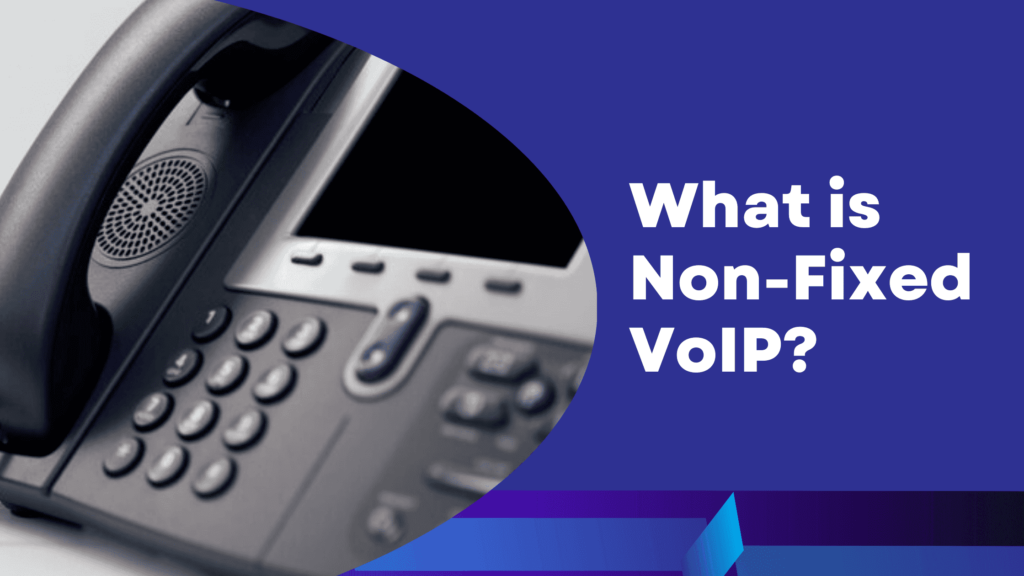How we communicate has fundamentally transformed, with increasing numbers of businesses and individuals turning to Voice Over Internet Protocol (VoIP) solutions. Specifically, non-fixed VoIP offers more flexibility and cost-effectiveness that traditional phone systems simply cannot match.
Did you know that over 31% of companies have already integrated some form of VoIP into their communication strategy? This technology not only allows for a more mobile workforce but also significantly reduces operational costs.
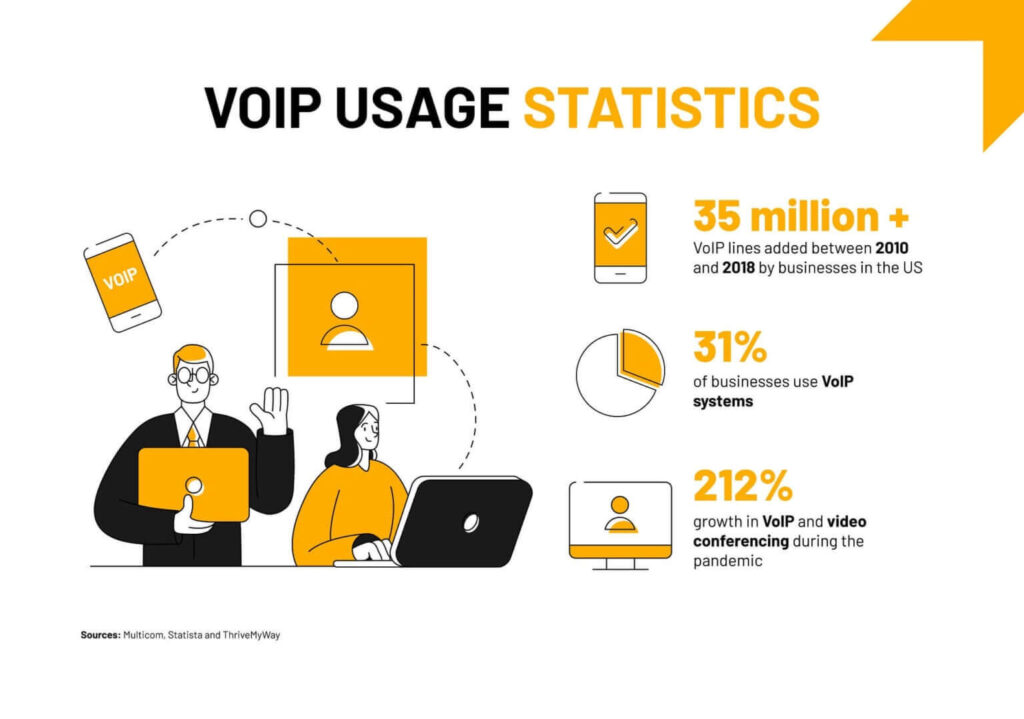
So if you’re running a startup or a large corporation, understanding how Non-Fixed VoIP can support your needs is crucial. In this comprehensive guide, we will guide you through the essential aspects of a Non-Fixed VoIP number, including its benefits features, and use cases that can enhance your business calling operation.
What is Non-Fixed VoIP
Non-Fixed VoIP, often called ‘virtual phone numbers‘ or “nomadic VoIP”, is a communication technology that does not require a fixed physical location to operate effectively.
Unlike traditional telephony which depends on physical lines or Fixed VoIP which operates only from a specific place, non-fixed VoIP lets you route calls over the Internet from any location.
This means you can make and receive calls using a high-speed internet connection from your smartphone, tablet, laptop, or desktop, avoiding the need for traditional telephone infrastructure.
The flexibility of non-fixed VoIP systems enables you to communicate continuously across regions, making it an essential tool for your business operating globally.
How does Non-fixed VoIP work
You might be having this question exactly how does non-fixed VoIP function and what makes it so unique compared to traditional phone systems?
Essentially, non-fixed VoIP operates by converting your voice into digital signals. The term digital signals means that your voice is transformed into a format that can be sent and received over digital networks rather than through copper wires or other traditional telephony infrastructure.
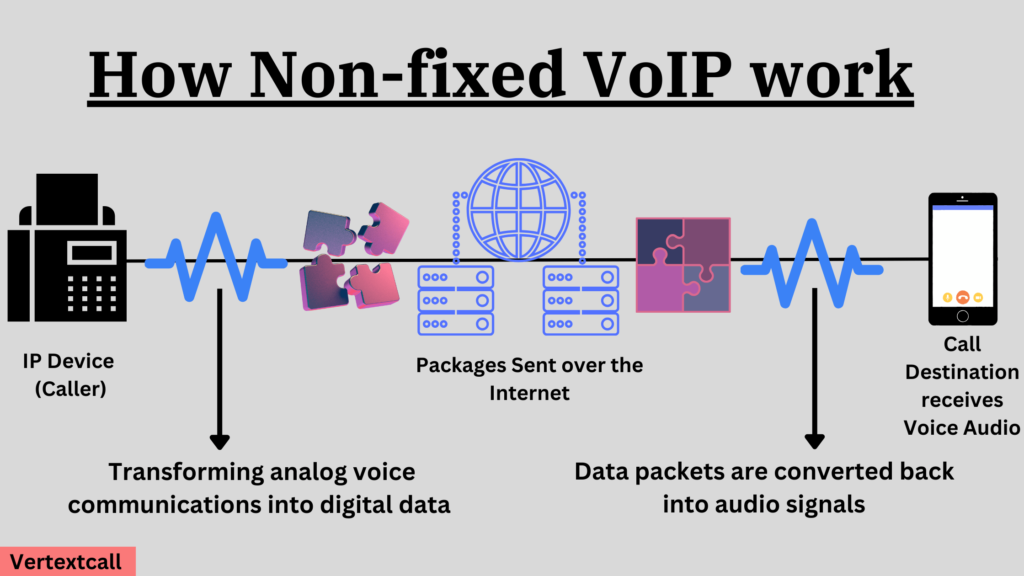
When you use a device that’s capable of VoIP communication, such as a smartphone, tablet, laptop, or even a desktop, your voice is immediately transformed into data packets. These packets travel across the internet to reach the recipient on the other end of the conversation.
At the receiving end, these data packets are converted back into audio signals (just like normal voice) that the recipient’s device plays back, allowing them to hear your voice as if you were using a traditional phone line.
Related Reading: Explanation of how VoIP works
Key features of Non-fixed VoIP
Non-fixed VoIP offers several features that make it a better option for your business:
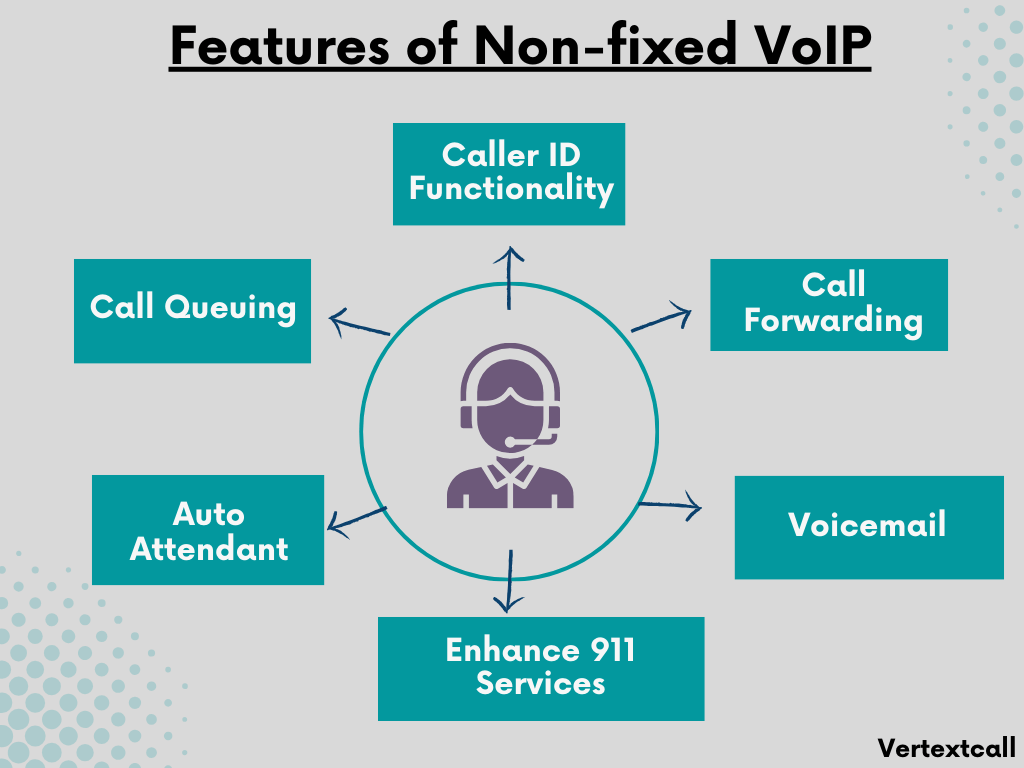
1/ Call Forwarding:
This feature allows calls made to your number to be forwarded to another phone number or device of your choice.
It means if someone calls you, and you’re not able to answer on your primary device, the call can be sent to another device, ensuring you don’t miss important calls.
This is particularly useful for business professionals who are often traveling or working from different locations.
2/ Call Waiting:
If you’re already on a call and someone else tries to reach you. Instead of getting a busy signal, Call Waiting lets you know there’s another call waiting for your attention.
You have the flexibility to place your current call on hold and switch to the new call. This way, you won’t miss out on calls even when you’re already engaged in a conversation.
3/ Auto-Attendant (IVR) Systems:
The Auto-Attendant of non-fixed VoIP is like a virtual receptionist for your business. When someone calls your number, this system can greet them with a recorded message and give them options. For example, “Press 1 for Sales, Press 2 for Support,” and so on.
This way, callers get directed to the right department without needing a real person to answer every time. It helps your business look professional and keeps things organized, making sure every caller gets the help they need efficiently.
4/ Customized Voicemail:
Customized Voicemail lets you create your voice message for a caller when you can’t pick up the phone. For example, a customized voicemail may sound like, “Sorry, I can’t talk right now, but please leave a message!”
This way, people can leave you a message, and you can get back to them when you’re free. It’s a great way to make sure you don’t miss out on anything important, and it lets people know you’ll call them back as soon as you can.
5/ Number Portability:
The feature of Number Portability refers to the capability to retain your existing phone number when switching from one service provider to another or when changing your physical location.
This feature is crucial for maintaining continuity in communication and ensuring that contacts can reach you without the need to update them with a new number.
It serves as a valuable tool for businesses and individuals who require a stable and consistent point of contact, regardless of changes in their service provider or geographical location.
6/ Enhanced Functionality:
Beyond these features, non-fixed VoIP offers enhanced functionality that traditional phone systems simply cannot match.
This includes video conferencing, instant messaging, file sharing, and integration with other digital platforms, providing a complete communication solution that adapts to the modern business environment.
Why would you use a Non-fixed VoIP number?
There can be many reasons for getting a non-fixed VoIP number. Most specifically it is ideal for those who value flexibility and mobility in their communication needs.
These numbers are also cost-effective, reducing the need for costly traditional phone lines or expensive mobile plans. Plus, they offer the convenience of easy setup without the need for a physical location.
Below we will discuss some of the key benefits of using Non-Fixed VoIP numbers for your communication needs.
Advantages of Non-fixed VoIP for your business
1/ Cost Efficiency:
The first compelling reason for you to consider using non-fixed VoIP technology within your business is the considerable cost savings it provides. In fact, according to Nextive businesses can reduce their phone cost by 50% by utilizing VoIP, especially if you compare it with traditional phone services.
On the other side, as we discussed above non-fixed VoIP operates over the Internet. This means you can make calls, including international ones, at a much cheaper cost compared to traditional phone lines.
Additionally, many of the advanced features that come standard with non-fixed VoIP systems, such as auto-attendant, call forwarding, and customized voicemail, are included at no extra charge.
2/ Improve scalability in operation:
The scalability aspect of non-fixed VoIP technology allows your business to easily adjust its communication capacity based on current needs.
This means you can add or remove lines, features, and services as your business grows or as demands change, without undergoing a complex and costly upgrade of your communication infrastructure.
3/ Integration with Business Tools:
Integrating non-fixed VoIP into your business’s existing tools and software platforms enhances operational efficiency. This integration capability means your VoIP system can work perfectly with customer relationship management (CRM) systems, email platforms, and productivity applications.
For instance, when a call comes in, your CRM can automatically display the caller’s information, providing valuable context for the interaction.
This integration between VoIP and other business tools streamlines workflows reduces the need for manual data entry, and enhances customer service by offering a more personalized and informed interaction.
4/ Global Reach at Local Rates:
The ability to communicate globally at local rates is another significant advantage of adopting non-fixed VoIP technology for your business.
This feature is especially beneficial for businesses with a global client base or those looking to expand into international markets.
By utilizing non-fixed VoIP, companies can maintain constant communication with overseas clients, partners, and remote employees without incurring the substantial charges typically associated with long-distance calls.
5/ Enhanced Customer Experience:
Offering a better experience to your customers can be achieved with non-fixed VoIP due to its variety of features. Essentially, this technology lets you easily manage calls, ensuring that every customer can quickly connect with the appropriate team member.
Features like auto-attendant mean your customers are not left waiting; they are directed immediately to where they need to be. Furthermore, because you can integrate VoIP with other business systems, customer information can appear automatically during calls. This allows for a more personalized conversation, making customers feel understood and valued.
Consideration and potential drawbacks of Non-fixed VoIP
1/ Dependence on Internet Connection:
One crucial aspect to consider with non-fixed VoIP is its dependence on your stable internet connection. Since all communication occurs over the Internet, the quality of your calls directly correlates with the speed and reliability of your Internet service.
If your business experiences frequent internet downtime or bandwidth limitations, this could lead to dropped calls, poor audio quality, and delays in message delivery.
2/ Security Vulnerabilities:
Another critical consideration is the security vulnerabilities associated with non-fixed VoIP services. Since your communications are conveyed over the internet, they are naturally at a greater risk of interception, eavesdropping, and cyber-attacks compared to traditional, hard-wired phone systems.
3/ Emergency Calls Limitation:
Non-fixed VoIP services do not automatically provide a fixed physical location to emergency service operators when a 911 call is made. This limitation means that in the event of an emergency, you or your employees need to verbally communicate your location to the responders, which could delay the response time during critical situations.
Therefore, ensuring your business has a plan in place for accurately and efficiently communicating location information during emergency calls is essential.
Related Reading: What are VoIP advantages and disadvantages
Table of differences between fixed and non-fixed VoIP
Fixed VoIP and non-fixed VoIP represent two different types of Voice over Internet Protocol (VoIP) services, each with its own set of characteristics and functionalities. Here’s a table of differences between them:
Differentiation Aspect | Fixed VoIP | Non-fixed VoIP |
Phone Number Assignment | Linked to a specific physical location or address. | Not connected to any specific location or address. |
Mobility | Limited; requires a physical connection to a phone line. | High; can be used anywhere with an internet connection. |
Cost | Typically incurs traditional telephony charges. | Lower costs, especially for international calls. |
Security | Perceived as more secure due to physical connections. | Potential for greater security risks without proper protection. |
Scalability | May require additional hardware for scalability. | Easily scalable with minimal to no additional hardware. |
Usage | Best suited for traditional office environments. | Ideal for remote work, global teams, and mobile users. |
To know more check our detailed guide on: Fixed VoIP vs. Non-Fixed VoIP: Core Differences & Meaning
Use cases for Non-fixed VoIP
Below are some practical use cases for Non-Fixed VoIP that demonstrate its flexibility and efficiency:
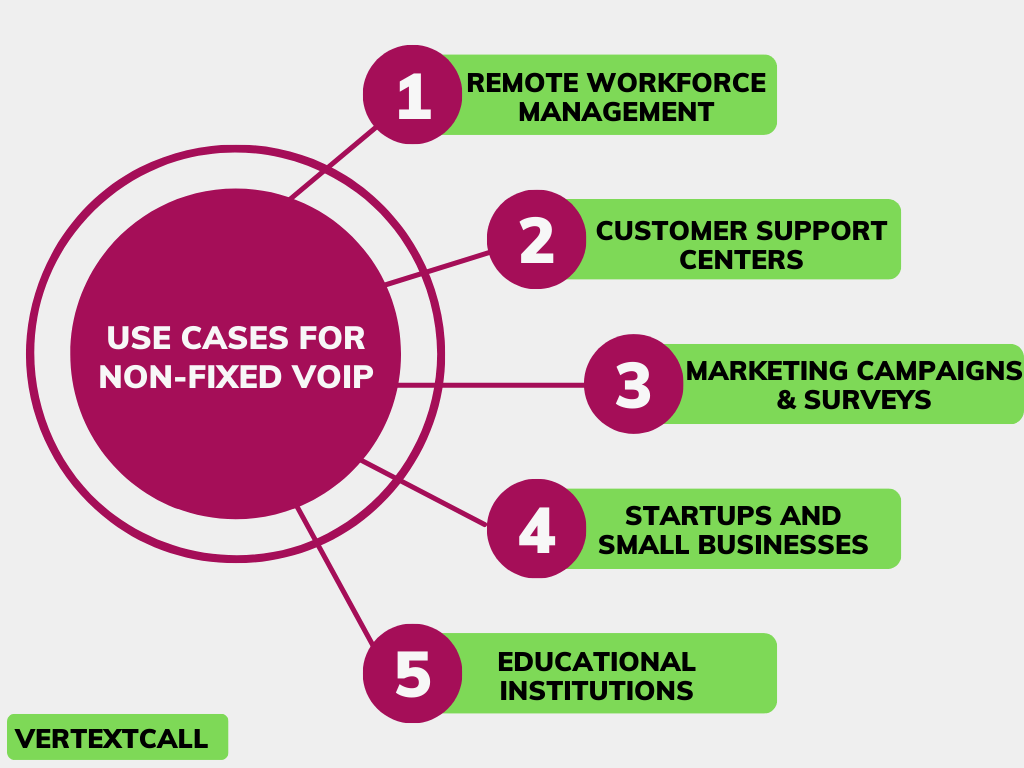
1/ Remote Workforce Management:
Non-fixed VoIP services are particularly beneficial for organizations still managing remote or hybrid teams. VoIP remote working allows employees to stay connected regardless of their physical location, using just an internet connection. This significantly improves interaction among team members located in various locations, ensuring constant connectivity.
2/ Customer Support Centers:
With its ability to handle high call volumes and integrate with various customer relationship management (CRM) systems, non-fixed VoIP is well-suited for customer support operations. It enables support centers to offer high-quality service with features like call routing, auto-attendant, and interactive voice response (IVR) systems.
3/ Marketing Campaigns and Surveys:
Businesses can use non-fixed VoIP services to conduct marketing campaigns and surveys. The technology supports outbound calling functionalities that make reaching out to potential customers easier, collecting valuable feedback, and conducting market research at a reduced cost.
4/ Startups and Small Businesses:
The low setup and operational costs of non-fixed VoIP systems make them an ideal choice for entrepreneurs and small businesses working within limited budgets. These systems provide a scalable and cost-effective communication solution that can grow with the company.
5/ Educational Institutions:
Schools and universities can utilize non-fixed VoIP systems to promote communication between students, parents, and staff. They can also support online learning initiatives by enabling virtual classrooms, seminars, and administrative meetings.
Related Reading: VoIP solutions for schools
How to choose a Non-fixed VoIP provider for your business
This selection process should be approached with a detailed evaluation of several key factors that directly impact the provider’s ability to meet your organization’s specific needs.
1/ Reliability and Uptime:
When choosing a non-fixed VoIP provider, it’s vital to consider their reliability and the consistency of their service uptime. You need a provider that guarantees high availability, ensuring that your communication channels remain open and functional around the clock.
Look for providers who make clear commitments to service reliability with comprehensive Service Level Agreements (SLAs). This aspect is crucial because any downtime can significantly impact your operations, from disrupting remote work to affecting customer support.
Therefore, prioritizing reliability and uptime in your selection criteria is essential for maintaining uninterrupted communication and business continuity.
2/ Quality of Service (QoS):
The quality of voice transmission is critical for maintaining professional communication. Service providers should offer tools that allow you to prioritize your VoIP data above other online activities, effectively reducing delays, interruptions, and disturbances during calls.
3/ Security Features:
In selecting a non-fixed VoIP provider, you must prioritize the security measures they implement to protect your data and communication. You should look for advanced encryption of voice data, secure authentication protocols, and regular security updates to reduce the risk of cyber threats.
The right provider will offer comprehensive security features that protect your conversations and sensitive information against unauthorized access and attacks.
This step is key in maintaining the confidentiality of your business communications, ensuring that your operations and client interactions remain secure and trustworthy.
4/ Customer Support and Service Level Agreements (SLAs):
Effective and responsive customer support is critical, especially if you rely heavily on your VoIP system for daily operations. Providers should offer you comprehensive SLAs that outline the expectations for support response times and resolution metrics.
5/ Feature Set:
When evaluating potential non-fixed VoIP providers, you must carefully consider the range of features they offer to ensure they align with your specific business needs. Look for a variety of functionalities such as call forwarding, voicemail, auto-attendant, and the ability to integrate with existing business applications.
These features are crucial for enhancing your team’s communication capabilities and improving customer interaction. Ensure that the provider you choose not only has a comprehensive set of features but also offers the flexibility to customize and scale these services as your business grows.
6/ Regulatory Compliance and Emergency Services:
Lastly, ensure that your chosen non-fixed VoIP provider complies with local and international telecommunications regulations, including emergency services support and data protection laws.
Frequently Asked Questions
Q1) Who uses a non-fixed VoIP number?
Ans: Non-fixed VoIP numbers are utilized by many users, including remote workers, freelancers, startups, small to medium-sized businesses, large corporations, educational institutions, and customer support centers.
These numbers are in demand among organizations that require flexible, cost-effective communication solutions without the need for a fixed geographical location.
Q2) Can you trace a non-fixed number and a text message?
Ans: Yes, it is possible to trace non-fixed numbers and text messages, although this typically requires specific tools. You can track non-fixed VoIP numbers and text messages with the help of internet service providers (ISPs) and telecommunications carriers.
This process often involves identifying the IP address used during the call or message exchange, allowing you to determine the location or device involved. You can also use some apps and services such as
reverse phone lookup that offer tracking capabilities for non-fixed numbers and texts. However, their effectiveness can vary, and you should be cautious of privacy laws and ethical considerations.
Q3) What does a Non-VoIP number mean?
Ans: A Non-VoIP number is a phone number that uses traditional phone lines or cellular networks instead of the Internet to make and receive calls. This type of number is connected to a physical line or a mobile network, which means it can be a landline in a home or office, or a number used on a mobile phone.
Non-VoIP numbers are known for their reliability and consistent quality because they don’t depend on an internet connection. These numbers are useful for those who need a stable and secure way to communicate, especially in areas where internet service might be unreliable.
Q4) Can you call back a non-fixed VoIP number?
Ans: Yes, you can call back a Non-Fixed VoIP number just as you would with any regular phone number. Non-Fixed VoIP numbers allow you to make and receive calls over the Internet, and you can return calls to these numbers using any standard phone, including landlines, mobile phones, or VoIP phones. There’s no special requirement or process needed to call back a Non-Fixed VoIP number.
Q5) What is a Fixed VoIP mean?
Ans: A Fixed VoIP stands for a “Fixed Voice Over Internet Protocol” and is essentially a phone service that uses your internet connection for making and receiving calls. The “fixed” part means the phone number is linked to a specific address, making it more stable and reliable for uses like business or home offices.
This setup allows for clearer calls and can often be cheaper than traditional phone services. Additionally, Fixed VoIP comes with useful features such as voicemail to email, the ability to choose your area code, and more.

